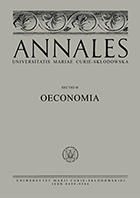Introduction of Geographic Information Systems into Business Education. The Case of Polish Students of Logistics
Introduction of Geographic Information Systems into Business Education. The Case of Polish Students of Logistics
Author(s): Lukasz WiechetekSubject(s): Education, Business Economy / Management, Geomatics, ICT Information and Communications Technologies
Published by: Wydawnictwo Naukowe Uniwersytetu Marii Curie-Sklodowskiej
Keywords: GIS; geographic information system; curriculum; GIS perception; student’s perspective; GIS framework;
Summary/Abstract: GIS; geographic information system; curriculum; GIS perception; student’s perspective; GIS framework. This article aims to extend current research in the area of teaching geographic information systems (GIS) in business faculties. GIS has a lot of areas of usage (logistics, trade, marketing, infrastructure management, public administration, archaeology, geology, meteorology forestry, agriculture environmental monitoring, aviation, statistics, education), however, it is not a popular subject especially in business school programs. Young people quickly learn and use new applications and technologies. Therefore, the author presents the GIS classes framework and the opinions of students about their knowledge and perception of GIS. The article contains the theoretical background of GIS and presents the main areas of geographic information systems usage. The main part of the paper is a framework of E-logistics and GIS programme prepared for the students of logistics at Maria Curie-Skłodowska University in Poland. The author also analyzes students' opinions about GIS and presents main conclusions derived from quantitative research conducted in a form of online questionnaire performed in January 2017 among a group of 96 students of logistics. At the end of the article, there can be found the proposal for future research. The author examined only the students of logistics at the Faculty of Economics, thus, a small group of young people. Some future research should be performed in order to compare the obtained results with GIS-related programmes from different universities in Poland and abroad.
Journal: Annales Universitatis Mariae Curie-Skłodowska, Sectio H Oeconomia
- Issue Year: LI/2017
- Issue No: 3
- Page Range: 147-160
- Page Count: 14
- Language: English

